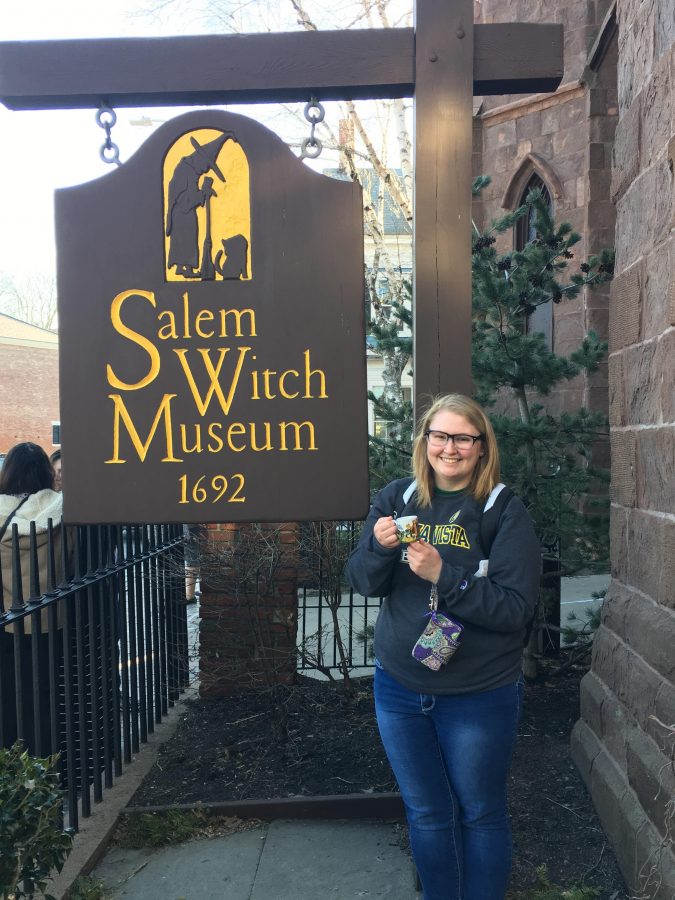Paganism: Why Are We Still Scared?
April 7, 2017
***Before this article starts, I feel as if it is fair to give you a background on my religious affiliation; I have none. I grew up in a Catholic/Christian household, but never attended a church service, prayed, or truly understood ‘God’ until just ten years ago, when I decided to explore Christianity myself. I’ve claimed to be an atheist, agnostic, and claimed to be non-religious during my lifetime. However, I never look down on other’s religious beliefs since it is something personal and meaningful to them. Just as mine are to me. I love exploring religions and understanding what makes people feel that sense of belonging. I encourage each of you to do the same. Open your mind and see what makes each person unique.
During my travels to New York with the BVU Concert Choir, I had the opportunity to spend some time in Salem, Massachusetts. Salem is known for their mass witch hysteria that occurred in the 1600s. I had the chance to tour the Salem Witch Museum, to hear the stories of the witch trials, history of witches in pop culture, and learn more about Paganism. During the time of the trials, many Pagans were often associated with the witchcraft and bewitching that was happening. Many people still assume that pagans are devil worshipers, evil, sexual deviants, and so on. However, paganism is nothing like witchcraft with crazy spells and what not.
While at the museum, our tour guide briefly explained Paganism and it left me wanting to know more. She explained that Pagans are highly involved in their environment and essentially worship nature. Together, Pagans all “share an ecological vision that comes from the Pagan belief in the organic vitality and spirituality of the natural world” (BBC). People who are part of the Paganism grouping “are deeply aware of the natural world and see the power of the divine in the ongoing cycle of life and death” (BBC). Instead of having an anthropocentric view on everything they are more concerned about the environment around them and doing as little harm as possible.
Many of the Pagan Holy Days are related to changes of the seasons. The Wheel of the Year is a cycle that is broken into eight different segments. Four are festivals that have Celtic ties while the other four are points on the solar calendar (which are different based on what hemisphere you’re located in). Pagans celebrate each of these segments as festivals to celebrate the beginning of the harvest, the arrival of summer and fertility, the beginning of winter, the changes to the solar calendar, and, of course, the Samhain. Samhain is the Feast of the Dead, or, for all the non-Pagans out there, Halloween! Samhain was a time that brought this world and the other world together by mingling. Death is the main theme of this Holy Day’s festival, but it is nothing to be afraid of. Pagans accept and understand that dying is just part of the circle of life. It is just as “necessary and welcome as birth” (BBC). The entire festival is very similar, in my opinion, to the Day of the Dead that is celebrated in Mexico. Individuals simply hold a feast for themselves and their loved ones that have passed on while also celebrating the births that have happened over the year. Obviously, this Holy Day was adopted by Christians and turned into All Hallows’ Eve where we dress up and receive candy from our neighbors. Shout out to Pagans for giving us one stellar holiday!
The biggest takeaway from Paganism is that they are based not only around nature but also equality. However, in certain situations, ceremonies, or representative positions women typically take the leading role. The divine is portrayed as feminine, masculine, and even seen without a gender.
With all of this information, it is quite disquieting that Paganism is still viewed as a scary, evil religious group. Paganism is a diverse community that does involve Wiccans, Druids, Shamans, Sacred Ecologists, Odinists, and Heathens, but that doesn’t mean they are evil. They don’t practice magic, cast spells, harm people or animals, or worship the devil. Why are we still scared of this religious culture? Because after all my research I’ve done, this religion just makes sense to me.
Reference
“BBC – Religion: Paganism.” BBC News. BBC, n.d. Web. 04 Apr. 2017.







